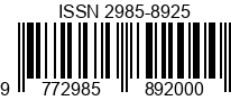Upaya Penegakan Hukum Terhadap AI (Artificial Intelligence) Sebagai Subjek Hukum Pidana dalam Perspektif Kriminologi
DOI:
https://doi.org/10.54298/tarunalaw.v3i01.300Keywords:
Artificial Intelligence, Subjek Hukum Pidana, Penegakan HukumAbstract
Artificial intelligence, or better known as AI, is experiencing very rapid development in today's technological era. Artificial Intelligence (AI) is an innovation that has changed many aspects of life in the world. The presence of machines with AI capabilities certainly has a disruptive impact on various social structures of society. One of the significant changes with the presence of AI is the legal science course, especially criminal law. The existence of a legal vacuum in the regulation of criminal law enforcement regarding AI or artificial intelligence initiated the author to conduct research related to law enforcement efforts against AI as a criminal law subject. This research aims to find out law enforcement against AI which can be the subject of criminal law. This study uses a type of juridical-normative research with a conceptual approach, a statute approach, and a comparative approach. Legal studies on artificial intelligence as perpetrators of criminal acts are quite minimal because they are not accompanied by regulations that regulate them. Artificial intelligence such as AI cannot perform illegal acts independently, because in its operation, AI requires help from humans. In Indonesia's positive law, artificial intelligence (AI) is not recognized as a legal subject as is a human or legal entity that is juridically recognized as a legal subject. Only legal subjects, both individuals and legal entities, can be held criminally liable. The right conclusion in this article is that the government should prepare regulations on AI as a subject of criminal acts and law enforcement against artificial intelligence. This arrangement is along with the identification of legal subjects, both individuals and legal entities, as well as appropriate laws to carry out law enforcement efforts against AI.
References
Arief Budiansyah. “Penegakan Hukum Terhadap Tindak Pidana Penipuan Online di Polda Aceh.” Skripsi, Universitas Islam Negeri Ar-Raniry, 2022.
Faizin Sulistio dan Aizahra Daffa Salsabilla. “Pertanggungjawaban pada Tindak Pidana yang Dilakukan Agen Otonom Artificial Intelegence.” UNES Law Review 6, no. 2 (Desember 2023).
Fatahillah, Muhammad Irfan. “Gagasan Pengaturan Artificial Intelligence Terhadap Pertanggung Jawaban Pidana di Indonesia.” Jurnal Suara Keadilan 24, no. 1 (20 Maret 2024): 37–43. https://doi.org/10.24176/sk.v24i1.11319.
Fence M. Wantu. Pengantar Ilmu Hukum. 1 ed. Gorontalo: UNG Press, 2015.
Haris, Muhammad Tan Abdul Rahman, dan Tantimin Tantimin. “Analisis Pertanggungjawaban Hukum Pidana terhadap Pemanfaatan Artificial Intelligence di Indonesia.” Jurnal Komunikasi Hukum (JKH) 8, no. 1 (1 Februari 2022): 307–16. https://doi.org/10.23887/jkh.v8i1.44408.
Karjadi, M., dan R. Soesilo. Kitab Undang-Undang Hukum Acara Pidana (KUHAP) dengan Penjelasan Resmi dan Komentar. 1 ed. Bogor: Politeia, 2016.
Khadafi Zidan Ramadhan dan I Dewa Gede Dana Sugama. “Penegakan Hukum Terhadap Penggunaan Teknologi AI: Teknik Deepfake Dalam Penyelenggaraan Pemilu.” Jurnal Kertha Desa 12, no. 5 (2024): 4514–28.
Kurniarullah, Muhammad Rizki, Talitha Nabila, Abdurrahman Khalidy, Vivi Juniarti Tan, dan Heni Widiyani. “Tinjauan Kriminologi Terhadap Penyalahgunaan Artificial Intelligence: Deepfake Pornografi Dan Pencurian Data Pribadi.” Jurnal Ilmiah Wahana Pendidikan 10, no. 10 (3 Juni 2024): 534–47. https://doi.org/10.5281/zenodo.11448814.
Kusuma, Gayatri, Inang Diva, Kania Maharani, dan Mikha Khamila. “Ius Constituendum: Pengaturan Artificial Intelligence sebagai Upaya Anti Cyber Laundering dalam Mekanisme Central Bank Digital Currency (CBDC).” Jurnal Pendidikan Tambusai 8, no. 2 (2024).
Lestari, Nabila Syahrani. “Kebijakan Formulasi Hukum Pidana Atas Praktik Deepfake Dilihat dari Perspektif Kejahatan Siber dan Pornografi.” Skripsi, Universitas Sriwijaya, 2024.
Marzuki, Peter Mahmud. Penelitian Hukum. 6 ed. Jakarta: Kecana, 2010.
Mufti, M. Wildan, M. Hiroshi Ikhsan, Rafif Sani, dan M. Fauzan. “Urgensi Pembentukan Peraturan Perundang-Undangan Teknologi Berbasis Artificial Intelligence.” Socius: Jurnal Penelitian Ilmu-Ilmu Sosial 1, no. 11 (2 Juni 2024): 137–41. https://doi.org/10.5281/ZENODO.11422903.
Nada, Fatimah, Favian Faruq Abqori, Inda Rahadiyan, dan Budi Agus Riswandi. “Gagasan Pengaturan Artificial Intelligence Sebagai Subjek Hukum Di Indonesia.” Prosiding Nasional Hukum Aktual Harmonisasi Hukum Pidana dalam Perspektif Demokrasi dan Hak Asasi Manusia 1, no. 1 (2024).
Nasution, Muhammad Idris, Muhammad Ali, dan Fauziah Lubis. “Pembaruan Sistem Pemidanaan di Indonesia: Kajian Literatur atas KUHP Baru.” Judge : Jurnal Hukum 5, no. 1 (2024). https://doi.org/doi.org/10.54209/judge.v5i02.xxx.
Nur Aliya Rasyidah, Muhammad Aksay, dan Muhammad Firdaus Akmal. “Urgensi Pembuatan Regulasi Penggunaan AI (Artificial Intelligence) di Indonesia.” Jurnal Penegakan Hukum Indonesia (JPHI) 5, no. 1 (Februari 2024).
Qurrahman, Shofika Hardiyanti, Safira Ayunil, dan Tsabita Aurelia Rahim. “Kedudukan dan Konsep Pertanggungjawaban Artificial Intelegence Dalam Hukum Positif Indonesia.” UNES Law Review 6, no. 4 (Juni 2024).
Ravizki, Eka Nanda dan Lintang Yudhantaka. “Artificial Intelligence Sebagai Subjek Hukum: Tinjauan Konseptual dan Tantangan Pengaturan di Indonesia.” Notaire 5, no. 3 (31 Oktober 2022): 351–76. https://doi.org/10.20473/ntr.v5i3.39063.
Sudaryono, dan Natangsa Surbakti. Hukum Pidana Dasar-Dasar Hukum Pidana Berdasarkan KUHP dan RUU KUHP. 1 ed. Surakarta: Muhammadiyah University Press, 2017.
Undang-Undang Nomor 1 Tahun 2023 Tentang Kitab Undang-Undang Hukum Pidana (t.t.).
Downloads
Published
How to Cite
Issue
Section
License
Copyright (c) 2025 Beryl Helga Fredella Hibatulloh

This work is licensed under a Creative Commons Attribution-ShareAlike 4.0 International License.
Authors who publish with this journal agree to the following terms:
- Authors retain copyright and grant the journal right of first publication with the work simultaneously licensed under a Creative Commons Attribution-ShareAlike that allows others to share the work with an acknowledgement of the work's authorship and initial publication in this journal.
- Authors are able to enter into separate, additional contractual arrangements for the non-exclusive distribution of the journal's published version of the work (e.g., post it to an institutional repository or publish it in a book), with an acknowledgement of its initial publication in this journal.
- Authors are permitted and encouraged to post their work online (e.g., in institutional repositories or on their website) prior to and during the submission process, as it can lead to productive exchanges, as well as earlier and greater citation of published work (See The Effect of Open Access).














